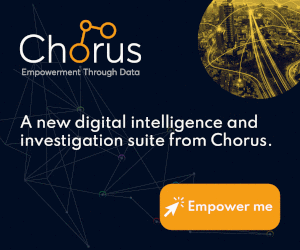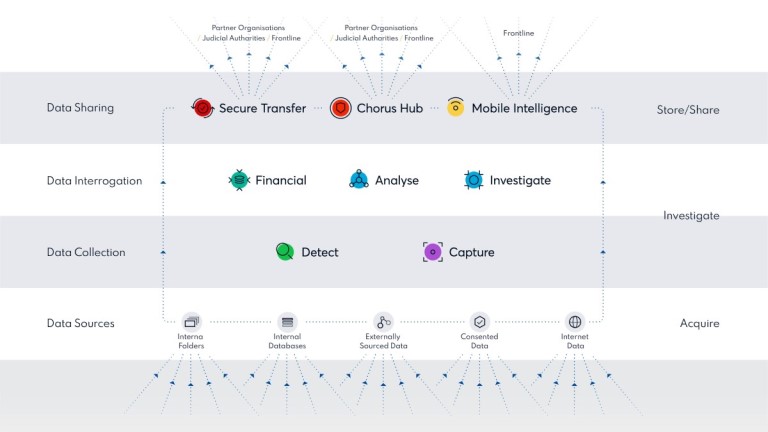Chorus Intelligence has been supporting law enforcement for close to a decade with software that enables Analysts and Investigators to cleanse, combine, and connect digital data for investigative purposes. We have learnt a lot during that time, and we have seen the industry change from one that was lacking the direction and capability to exploit the opportunities that data brings, to one that is now ready.
Data is in lots of places. It is difficult to access, interrogate, and share
We have seen data volumes explode as criminals increasingly create new and innovative ways to communicate via technology to avoid detection. This has made crime more difficult to investigate, especially complex cases and internet facilitated offences. A lack of investment in the right tools is a core reason for these struggles and many forces are having to rely on a small number of ‘experts’ to investigate the masses of data relating to a case. The result is a lack of time and resource to investigate every case, meaning only the most serious cases are fully resourced, and others left unresolved or receiving a minimal level of service.
In this article, I will explore the data challenges that face law enforcement, and how Chorus and our new intelligence suite helps to overcome them.
Data, data everywhere
Without being able to analyse data comprehensively and systematically, policing won’t be as efficient as it can be
HMICFRS ‘State of Policing’ report
UK policing has recognised that existing capabilities are inadequate, and the 2030 National Policing Digital Strategy set out the ambitions for the sector and what is required to deliver them. The recent HMICFRS ‘State of Policing’ report identified that; “Without being able to analyse data comprehensively and systematically, policing won’t be as efficient as it can be.” For Chorus, it comes down to one thing. Data. Our experience in the sector has helped us to understand the data challenges that forces face when conducting digital investigations. They can be summarised by the following.
Data is in lots of places. It is difficult to access, interrogate, and share.
Accessing data
Most digital intelligence and investigation work will start with the same task, finding and accessing relevant data. This can be a complicated and time-consuming process. Many studies have shown that across all organisations, staff members spend around 20% their working day searching for the information they need to do their jobs.  Data is often in silos and requires multiple logins and access rights to answer the question, ‘what do we already know about this offender, location, or victim?’. The internet and dark web offer another source of data, but again, searching is a time-consuming process and the technology to remain anonymous when searching is only available to a few of the above-mentioned experts.
Data is often in silos and requires multiple logins and access rights to answer the question, ‘what do we already know about this offender, location, or victim?’. The internet and dark web offer another source of data, but again, searching is a time-consuming process and the technology to remain anonymous when searching is only available to a few of the above-mentioned experts.
External data in the form of call data records, ANPR, and device downloads all enter the equation as the case progresses, but they all get stored in a variety of locations that add time and complexity to an investigation. This complexity is then exacerbated by varying levels of knowledge and competence by staff accessing and interrogating multiple systems, virtually guaranteeing that key information is missed.
Interrogating data
The interrogation of data is an area where Chorus products are already widely used across law enforcement but even with the right tools it can be a difficult task. For anyone not using technology to cleanse and analyse their data, it must be near impossible to answer key investigative questions and draw insights for operational use. Hundreds of thousands of lines of data, acquired from electronic devices and call data records, are common for ‘routine’ investigations and place a strain on those who are trying to spot patterns and connections and adhere to disclosure requirements.
The above referenced Sir Thomas Winsor report also declared that, “it will be impossible for the police and prosecutors to achieve prompt and true justice without highly effective technological methods to acquire and analyse the large quantities of data now available in criminal cases”. With the use of internet-enabled devices set to keep on growing, so will the demand placed on those that are tasked to look at the data.
Technology must be the solution to a problem that technology itself has created
Storing and sharing data
With internet facilitated crime and organised crime such as County Lines on the rise, the need to collaborate on investigations from geographically dispersed locations is now essential. Working with other forces and local authorities to protect the vulnerable is key and we have seen some successes recently such as Operation Venetic. However, storing and sharing data is, essentially, very difficult. Having somewhere to store timelines, maps, reports, internet intelligence and other digital evidence and then share it with partner forces and organisations such as the Crown Prosecution Service is again, very difficult. Access needs to be audited and the information needs to remain searchable to be able to inform other investigations and avoid duplication of work.
A tipping point
We’ve reached a tipping point within law enforcement where the scale of the data challenges are starting to overwhelm those tasked with protecting the public. Commissioner Dick described the crime-solving rate as ‘woefully low’ in 2019 as the rate dropped to just over 7% for cases where charges were brought. Unless action is taken soon, public confidence in policing might be dented too deeply for it to recover. Technology must be the solution to a problem that technology itself has created, and I firmly believe that at Chorus we have built something that offers game-changing capabilities for law enforcement and those conducting digital investigations.
It empowers multiple disciplines to locate and interrogate data and simply and confidently turn it into intelligence and evidence
The Chorus Intelligence Suite
We have launched a new suite of products that allows law enforcement to conduct every aspect of a digital investigation from one place as efficiently as possible. It empowers multiple disciplines to locate and interrogate data and simply and confidently turn it into intelligence and evidence. Forces and agencies can make large efficiency savings and make faster, more informed decisions to solve crime and provide a 21st century service for victims of crime.
The suite is modular and contains different software products that seamlessly integrate and offer unparalleled functionality for those involved in digital investigations.
Working together the Chorus Intelligence suite can:
- Search any data for cross-case analysis and fast triage of new data to help with resource allocation.
- Capture any web page or social media post evidentially and store it in a secure, encrypted hub.
- Quickly interrogate vast amounts of data from devices, call data records, financial transactions, and other sources to get answers.
- Enrich analytical products using data obtained from the internet or via consented data providers to provide 360-degree situational awareness of People, Objects, Locations or Entities (POLE).
- Automatically generate courtroom-ready reports to be used as evidence.
- Store all intelligence and data that has been gathered for an investigation in a single, secure, and searchable hub.
- Audit access to that data and share it with partner forces, agencies, and other bodies such as the CPS to enable greater collaboration.
- Gather electronic evidence remotely or face-to-face from victims and witnesses.
21st century service for victims
From speaking with senior members of law enforcement about our offering and seeing how those first users are embracing the tools, we understand there to be several benefits to UK forces and the public they serve. Firstly, the potential for efficiency savings is huge. We have already seen time savings of 97% from just our Analyse product. Multiply this across different areas of an investigation and we can drastically reduce the time it takes to ensure a successful outcome of a case.
Greater efficiency should translate into improved detection and enforcement rates as more investigations can be carried out by the same amount of people resource. We are also able to tackle concerns around risk. Policing is about identifying threats and reducing risk. The ability to easily view all the data available to you reduces the risk of missing an important link or a case collapsing and further eroding public confidence.
Greater efficiency should translate into improved detection and enforcement rates as more investigations can be carried out by the same amount of people resource
Overall, I believe we would see an improved service for victims of crime. Not just through being able to resource more of their requests, but by delivering faster, more positive outcomes that reduces stress and the impact on their lives.
Empowerment through data
As we enter a new digital age of policing, I must stress that these tools are only as good as the person driving them and the final decision of any part of policing must rest with the human being. Empowering multiple disciplines to make better, more informed decisions is at the heart of our system and we have ensured that we democratise data and serve it up in a way that anyone can simply and confidently turn it into intelligence and evidence.
We have always worked as closely as we can with our customers, and I see the work that we do as more of a partnership. Seeing the positive results that the police achieve from using our tools gives us a great sense of purpose that myself and everyone at Chorus are immensely proud of and something that I believe our new suite will only deliver more of.
If you would like to learn more about the Chorus suite then visit our website or contact us at [email protected]





